Professional Identity and Practice Report: Service Industry Analysis
VerifiedAdded on 2021/02/19
|15
|4467
|43
Report
AI Summary
This report delves into the realm of professional identity and practice, focusing on the skills and competencies essential for a marketing manager role within the travel and tourism industry, specifically using Thomas Cook as a case study. The report commences with an exploration of the benefits of ongoing professional development for various stakeholders, including employers and employees, and examines employer expectations regarding skills. A self-assessment of abilities, skills, and competencies is conducted, followed by a review of learning theories and approaches relevant to personal and professional development. Furthermore, the report includes the construction of a development plan aimed at enhancing skills and competencies, and concludes with an analysis of a job interview process relevant to the service industry, along with an evaluation of its strengths and weaknesses. The report provides a holistic overview of the key aspects of professional development and its practical application in a real-world business context.
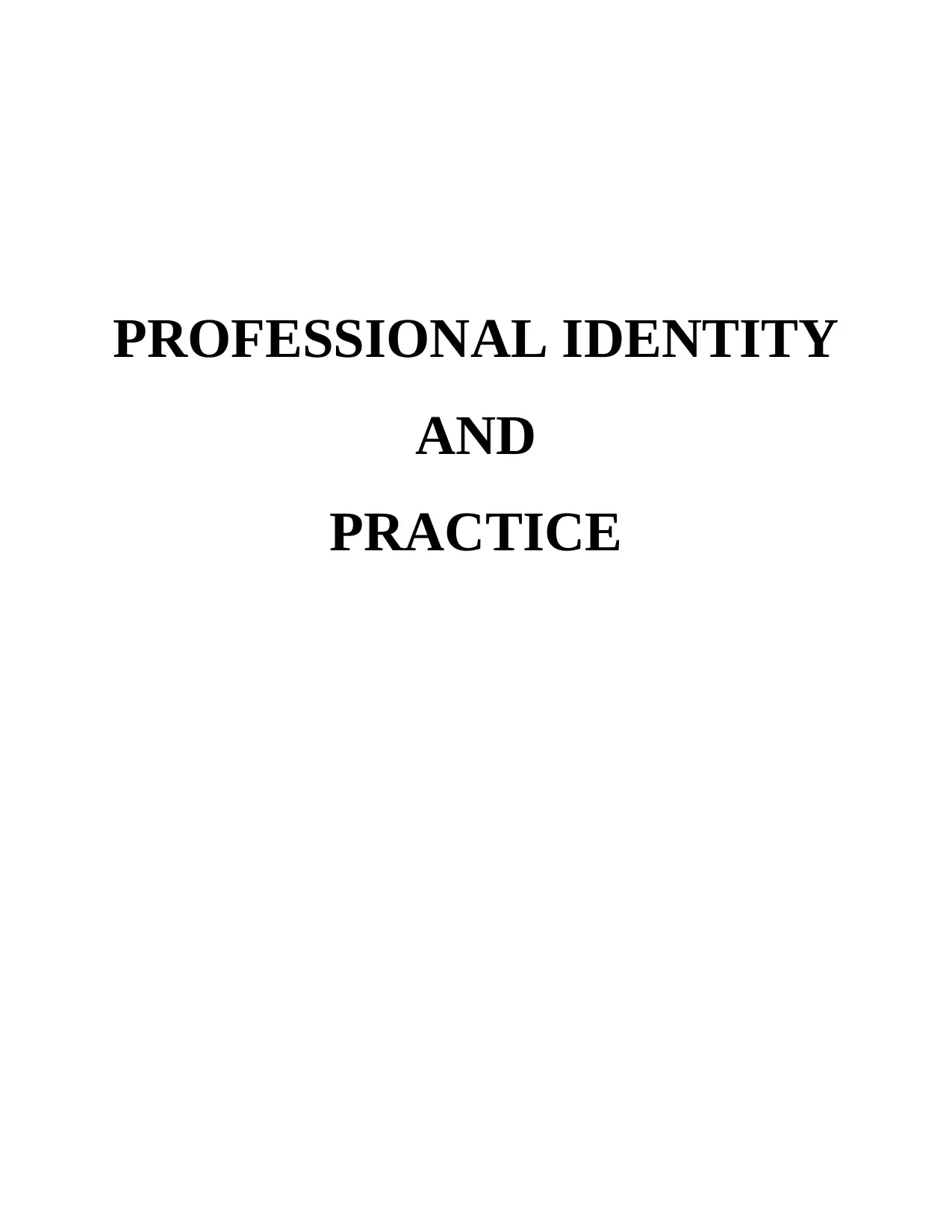
PROFESSIONAL IDENTITY
AND
PRACTICE
AND
PRACTICE
Paraphrase This Document
Need a fresh take? Get an instant paraphrase of this document with our AI Paraphraser
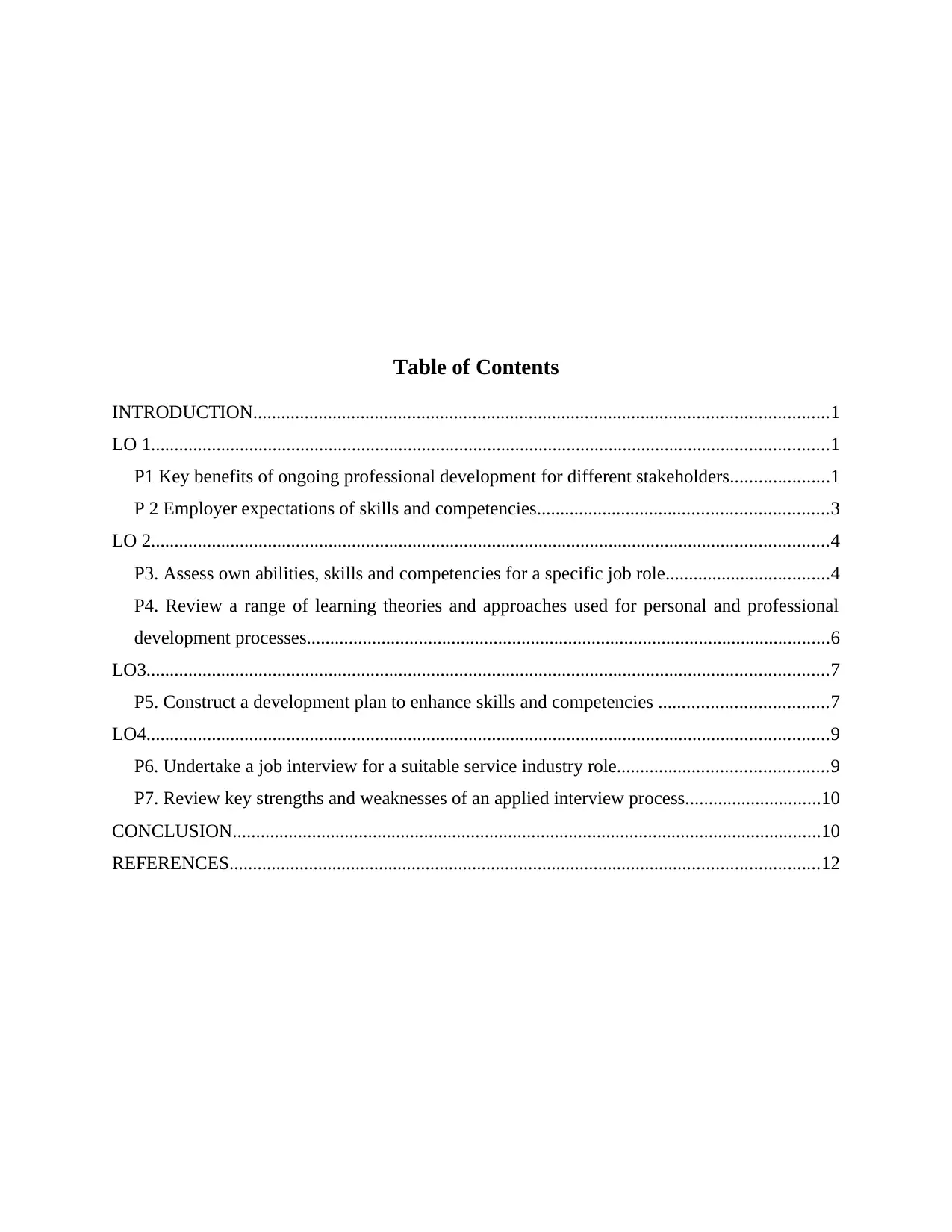
Table of Contents
INTRODUCTION...........................................................................................................................1
LO 1.................................................................................................................................................1
P1 Key benefits of ongoing professional development for different stakeholders.....................1
P 2 Employer expectations of skills and competencies..............................................................3
LO 2.................................................................................................................................................4
P3. Assess own abilities, skills and competencies for a specific job role...................................4
P4. Review a range of learning theories and approaches used for personal and professional
development processes................................................................................................................6
LO3..................................................................................................................................................7
P5. Construct a development plan to enhance skills and competencies ....................................7
LO4..................................................................................................................................................9
P6. Undertake a job interview for a suitable service industry role.............................................9
P7. Review key strengths and weaknesses of an applied interview process.............................10
CONCLUSION..............................................................................................................................10
REFERENCES..............................................................................................................................12
INTRODUCTION...........................................................................................................................1
LO 1.................................................................................................................................................1
P1 Key benefits of ongoing professional development for different stakeholders.....................1
P 2 Employer expectations of skills and competencies..............................................................3
LO 2.................................................................................................................................................4
P3. Assess own abilities, skills and competencies for a specific job role...................................4
P4. Review a range of learning theories and approaches used for personal and professional
development processes................................................................................................................6
LO3..................................................................................................................................................7
P5. Construct a development plan to enhance skills and competencies ....................................7
LO4..................................................................................................................................................9
P6. Undertake a job interview for a suitable service industry role.............................................9
P7. Review key strengths and weaknesses of an applied interview process.............................10
CONCLUSION..............................................................................................................................10
REFERENCES..............................................................................................................................12
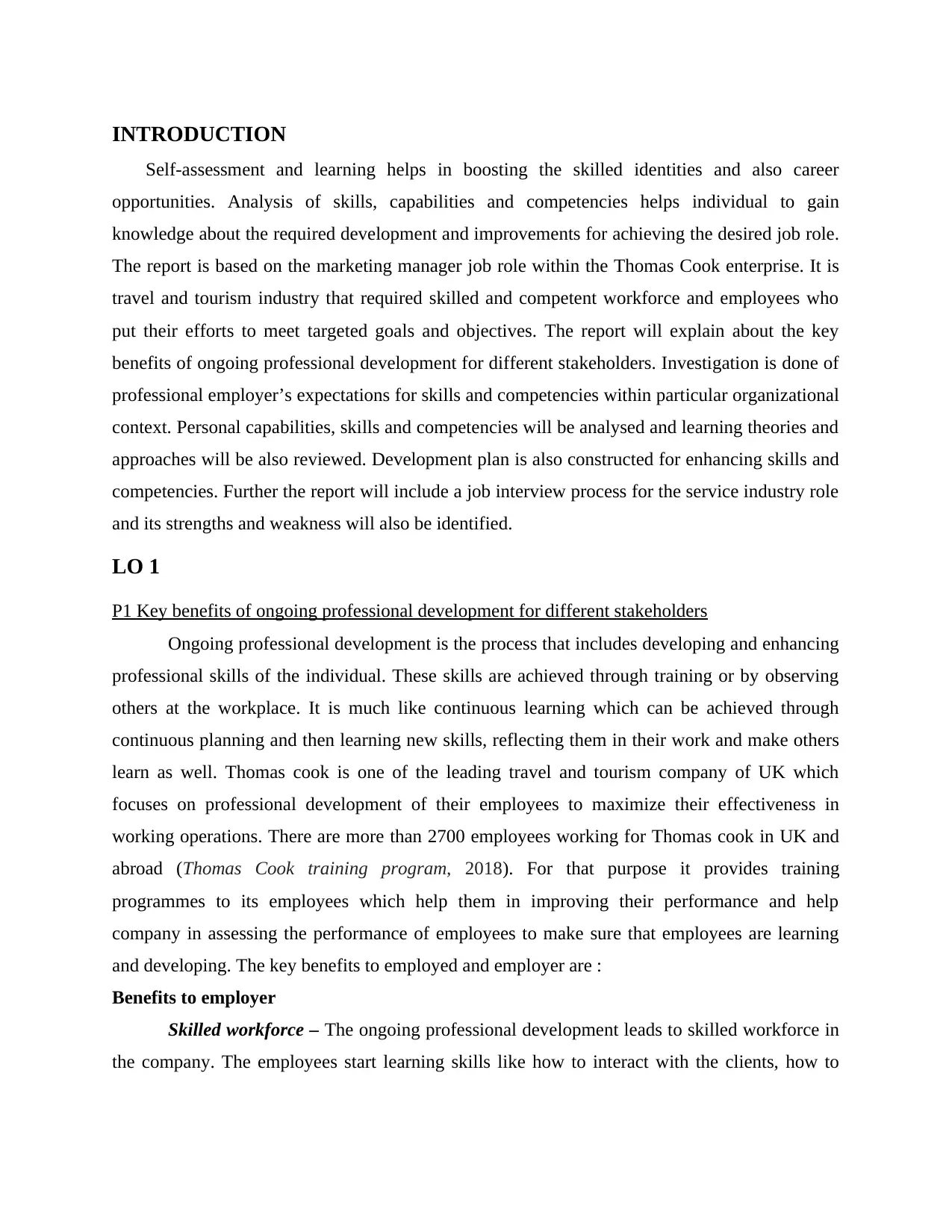
INTRODUCTION
Self-assessment and learning helps in boosting the skilled identities and also career
opportunities. Analysis of skills, capabilities and competencies helps individual to gain
knowledge about the required development and improvements for achieving the desired job role.
The report is based on the marketing manager job role within the Thomas Cook enterprise. It is
travel and tourism industry that required skilled and competent workforce and employees who
put their efforts to meet targeted goals and objectives. The report will explain about the key
benefits of ongoing professional development for different stakeholders. Investigation is done of
professional employer’s expectations for skills and competencies within particular organizational
context. Personal capabilities, skills and competencies will be analysed and learning theories and
approaches will be also reviewed. Development plan is also constructed for enhancing skills and
competencies. Further the report will include a job interview process for the service industry role
and its strengths and weakness will also be identified.
LO 1
P1 Key benefits of ongoing professional development for different stakeholders
Ongoing professional development is the process that includes developing and enhancing
professional skills of the individual. These skills are achieved through training or by observing
others at the workplace. It is much like continuous learning which can be achieved through
continuous planning and then learning new skills, reflecting them in their work and make others
learn as well. Thomas cook is one of the leading travel and tourism company of UK which
focuses on professional development of their employees to maximize their effectiveness in
working operations. There are more than 2700 employees working for Thomas cook in UK and
abroad (Thomas Cook training program, 2018). For that purpose it provides training
programmes to its employees which help them in improving their performance and help
company in assessing the performance of employees to make sure that employees are learning
and developing. The key benefits to employed and employer are :
Benefits to employer
Skilled workforce – The ongoing professional development leads to skilled workforce in
the company. The employees start learning skills like how to interact with the clients, how to
Self-assessment and learning helps in boosting the skilled identities and also career
opportunities. Analysis of skills, capabilities and competencies helps individual to gain
knowledge about the required development and improvements for achieving the desired job role.
The report is based on the marketing manager job role within the Thomas Cook enterprise. It is
travel and tourism industry that required skilled and competent workforce and employees who
put their efforts to meet targeted goals and objectives. The report will explain about the key
benefits of ongoing professional development for different stakeholders. Investigation is done of
professional employer’s expectations for skills and competencies within particular organizational
context. Personal capabilities, skills and competencies will be analysed and learning theories and
approaches will be also reviewed. Development plan is also constructed for enhancing skills and
competencies. Further the report will include a job interview process for the service industry role
and its strengths and weakness will also be identified.
LO 1
P1 Key benefits of ongoing professional development for different stakeholders
Ongoing professional development is the process that includes developing and enhancing
professional skills of the individual. These skills are achieved through training or by observing
others at the workplace. It is much like continuous learning which can be achieved through
continuous planning and then learning new skills, reflecting them in their work and make others
learn as well. Thomas cook is one of the leading travel and tourism company of UK which
focuses on professional development of their employees to maximize their effectiveness in
working operations. There are more than 2700 employees working for Thomas cook in UK and
abroad (Thomas Cook training program, 2018). For that purpose it provides training
programmes to its employees which help them in improving their performance and help
company in assessing the performance of employees to make sure that employees are learning
and developing. The key benefits to employed and employer are :
Benefits to employer
Skilled workforce – The ongoing professional development leads to skilled workforce in
the company. The employees start learning skills like how to interact with the clients, how to
⊘ This is a preview!⊘
Do you want full access?
Subscribe today to unlock all pages.

Trusted by 1+ million students worldwide
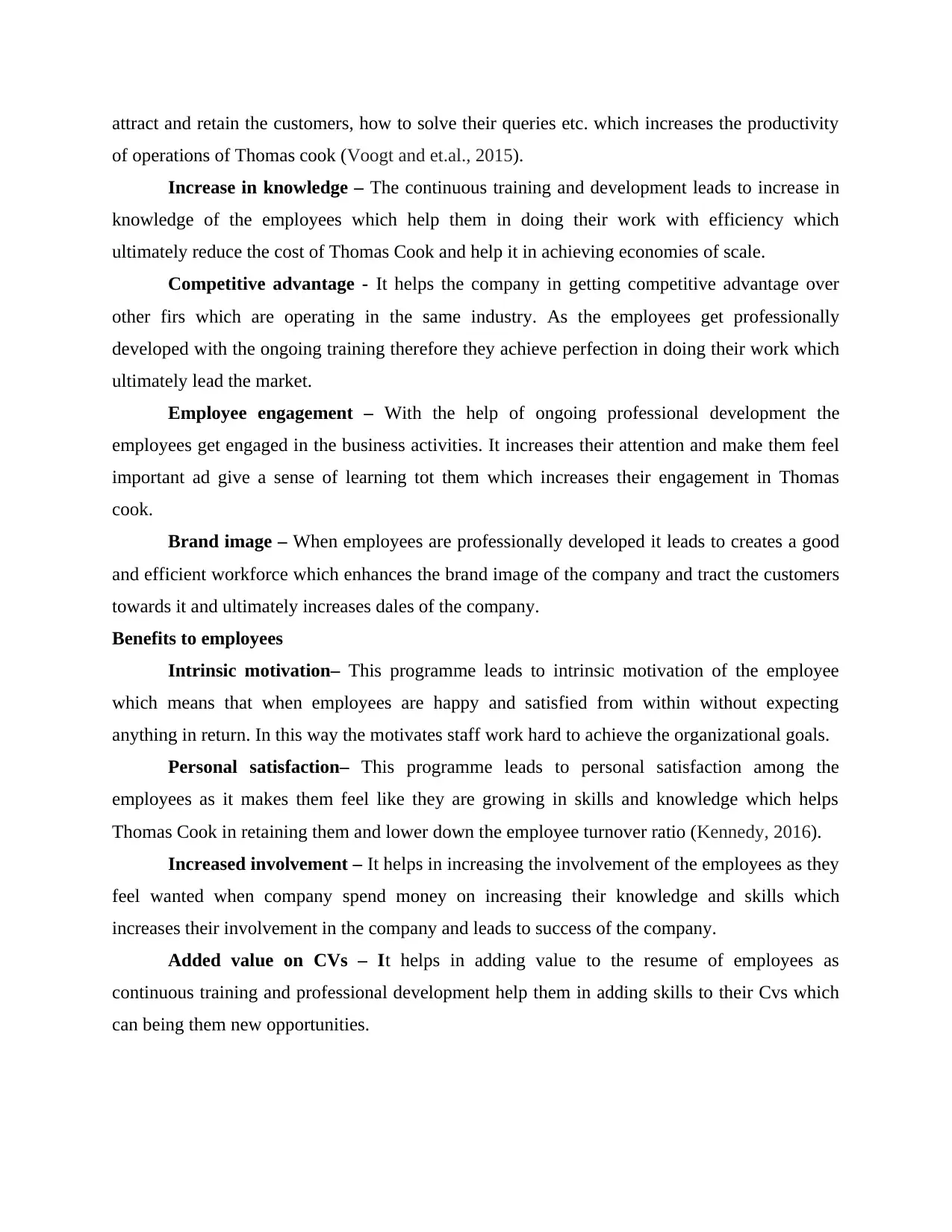
attract and retain the customers, how to solve their queries etc. which increases the productivity
of operations of Thomas cook (Voogt and et.al., 2015).
Increase in knowledge – The continuous training and development leads to increase in
knowledge of the employees which help them in doing their work with efficiency which
ultimately reduce the cost of Thomas Cook and help it in achieving economies of scale.
Competitive advantage - It helps the company in getting competitive advantage over
other firs which are operating in the same industry. As the employees get professionally
developed with the ongoing training therefore they achieve perfection in doing their work which
ultimately lead the market.
Employee engagement – With the help of ongoing professional development the
employees get engaged in the business activities. It increases their attention and make them feel
important ad give a sense of learning tot them which increases their engagement in Thomas
cook.
Brand image – When employees are professionally developed it leads to creates a good
and efficient workforce which enhances the brand image of the company and tract the customers
towards it and ultimately increases dales of the company.
Benefits to employees
Intrinsic motivation– This programme leads to intrinsic motivation of the employee
which means that when employees are happy and satisfied from within without expecting
anything in return. In this way the motivates staff work hard to achieve the organizational goals.
Personal satisfaction– This programme leads to personal satisfaction among the
employees as it makes them feel like they are growing in skills and knowledge which helps
Thomas Cook in retaining them and lower down the employee turnover ratio (Kennedy, 2016).
Increased involvement – It helps in increasing the involvement of the employees as they
feel wanted when company spend money on increasing their knowledge and skills which
increases their involvement in the company and leads to success of the company.
Added value on CVs – It helps in adding value to the resume of employees as
continuous training and professional development help them in adding skills to their Cvs which
can being them new opportunities.
of operations of Thomas cook (Voogt and et.al., 2015).
Increase in knowledge – The continuous training and development leads to increase in
knowledge of the employees which help them in doing their work with efficiency which
ultimately reduce the cost of Thomas Cook and help it in achieving economies of scale.
Competitive advantage - It helps the company in getting competitive advantage over
other firs which are operating in the same industry. As the employees get professionally
developed with the ongoing training therefore they achieve perfection in doing their work which
ultimately lead the market.
Employee engagement – With the help of ongoing professional development the
employees get engaged in the business activities. It increases their attention and make them feel
important ad give a sense of learning tot them which increases their engagement in Thomas
cook.
Brand image – When employees are professionally developed it leads to creates a good
and efficient workforce which enhances the brand image of the company and tract the customers
towards it and ultimately increases dales of the company.
Benefits to employees
Intrinsic motivation– This programme leads to intrinsic motivation of the employee
which means that when employees are happy and satisfied from within without expecting
anything in return. In this way the motivates staff work hard to achieve the organizational goals.
Personal satisfaction– This programme leads to personal satisfaction among the
employees as it makes them feel like they are growing in skills and knowledge which helps
Thomas Cook in retaining them and lower down the employee turnover ratio (Kennedy, 2016).
Increased involvement – It helps in increasing the involvement of the employees as they
feel wanted when company spend money on increasing their knowledge and skills which
increases their involvement in the company and leads to success of the company.
Added value on CVs – It helps in adding value to the resume of employees as
continuous training and professional development help them in adding skills to their Cvs which
can being them new opportunities.
Paraphrase This Document
Need a fresh take? Get an instant paraphrase of this document with our AI Paraphraser
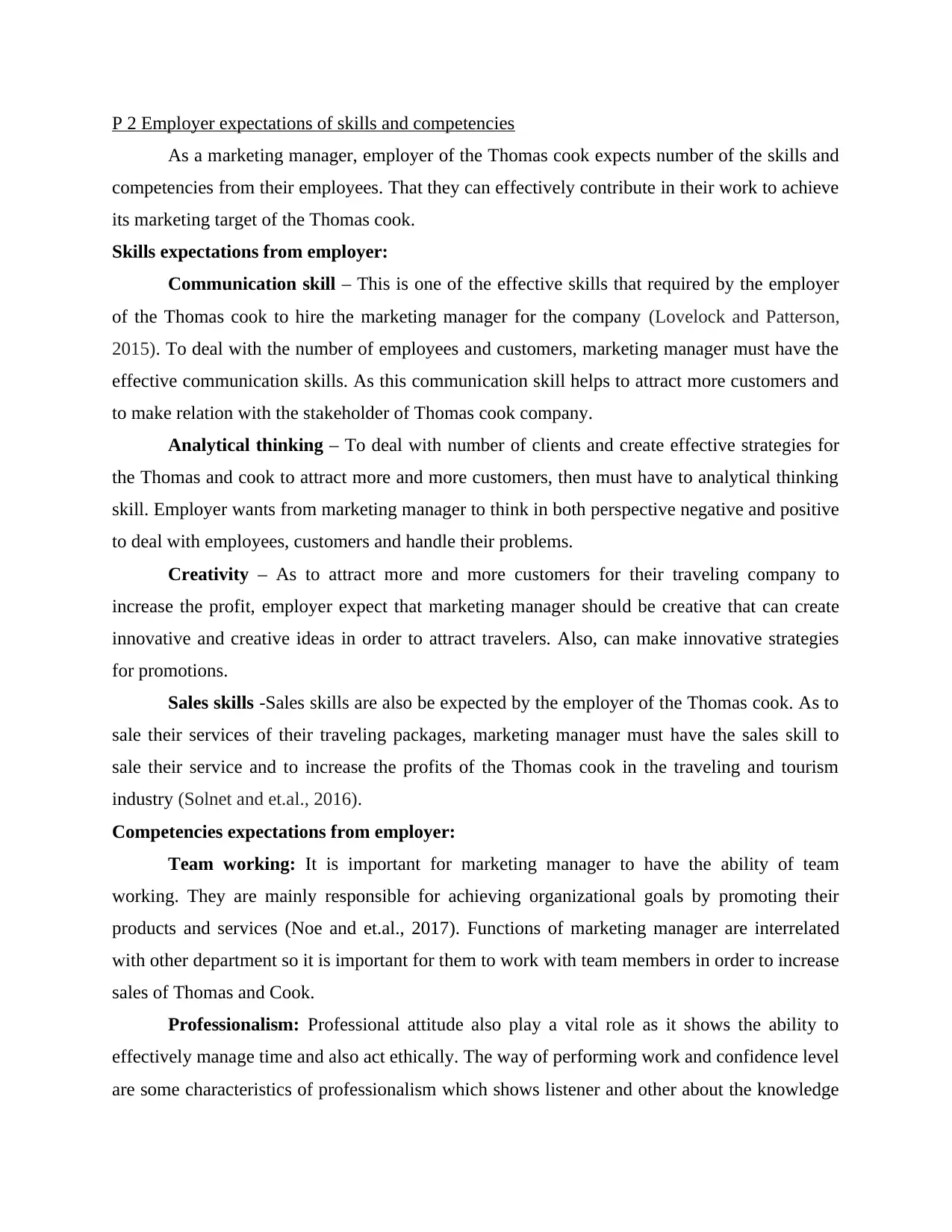
P 2 Employer expectations of skills and competencies
As a marketing manager, employer of the Thomas cook expects number of the skills and
competencies from their employees. That they can effectively contribute in their work to achieve
its marketing target of the Thomas cook.
Skills expectations from employer:
Communication skill – This is one of the effective skills that required by the employer
of the Thomas cook to hire the marketing manager for the company (Lovelock and Patterson,
2015). To deal with the number of employees and customers, marketing manager must have the
effective communication skills. As this communication skill helps to attract more customers and
to make relation with the stakeholder of Thomas cook company.
Analytical thinking – To deal with number of clients and create effective strategies for
the Thomas and cook to attract more and more customers, then must have to analytical thinking
skill. Employer wants from marketing manager to think in both perspective negative and positive
to deal with employees, customers and handle their problems.
Creativity – As to attract more and more customers for their traveling company to
increase the profit, employer expect that marketing manager should be creative that can create
innovative and creative ideas in order to attract travelers. Also, can make innovative strategies
for promotions.
Sales skills -Sales skills are also be expected by the employer of the Thomas cook. As to
sale their services of their traveling packages, marketing manager must have the sales skill to
sale their service and to increase the profits of the Thomas cook in the traveling and tourism
industry (Solnet and et.al., 2016).
Competencies expectations from employer:
Team working: It is important for marketing manager to have the ability of team
working. They are mainly responsible for achieving organizational goals by promoting their
products and services (Noe and et.al., 2017). Functions of marketing manager are interrelated
with other department so it is important for them to work with team members in order to increase
sales of Thomas and Cook.
Professionalism: Professional attitude also play a vital role as it shows the ability to
effectively manage time and also act ethically. The way of performing work and confidence level
are some characteristics of professionalism which shows listener and other about the knowledge
As a marketing manager, employer of the Thomas cook expects number of the skills and
competencies from their employees. That they can effectively contribute in their work to achieve
its marketing target of the Thomas cook.
Skills expectations from employer:
Communication skill – This is one of the effective skills that required by the employer
of the Thomas cook to hire the marketing manager for the company (Lovelock and Patterson,
2015). To deal with the number of employees and customers, marketing manager must have the
effective communication skills. As this communication skill helps to attract more customers and
to make relation with the stakeholder of Thomas cook company.
Analytical thinking – To deal with number of clients and create effective strategies for
the Thomas and cook to attract more and more customers, then must have to analytical thinking
skill. Employer wants from marketing manager to think in both perspective negative and positive
to deal with employees, customers and handle their problems.
Creativity – As to attract more and more customers for their traveling company to
increase the profit, employer expect that marketing manager should be creative that can create
innovative and creative ideas in order to attract travelers. Also, can make innovative strategies
for promotions.
Sales skills -Sales skills are also be expected by the employer of the Thomas cook. As to
sale their services of their traveling packages, marketing manager must have the sales skill to
sale their service and to increase the profits of the Thomas cook in the traveling and tourism
industry (Solnet and et.al., 2016).
Competencies expectations from employer:
Team working: It is important for marketing manager to have the ability of team
working. They are mainly responsible for achieving organizational goals by promoting their
products and services (Noe and et.al., 2017). Functions of marketing manager are interrelated
with other department so it is important for them to work with team members in order to increase
sales of Thomas and Cook.
Professionalism: Professional attitude also play a vital role as it shows the ability to
effectively manage time and also act ethically. The way of performing work and confidence level
are some characteristics of professionalism which shows listener and other about the knowledge
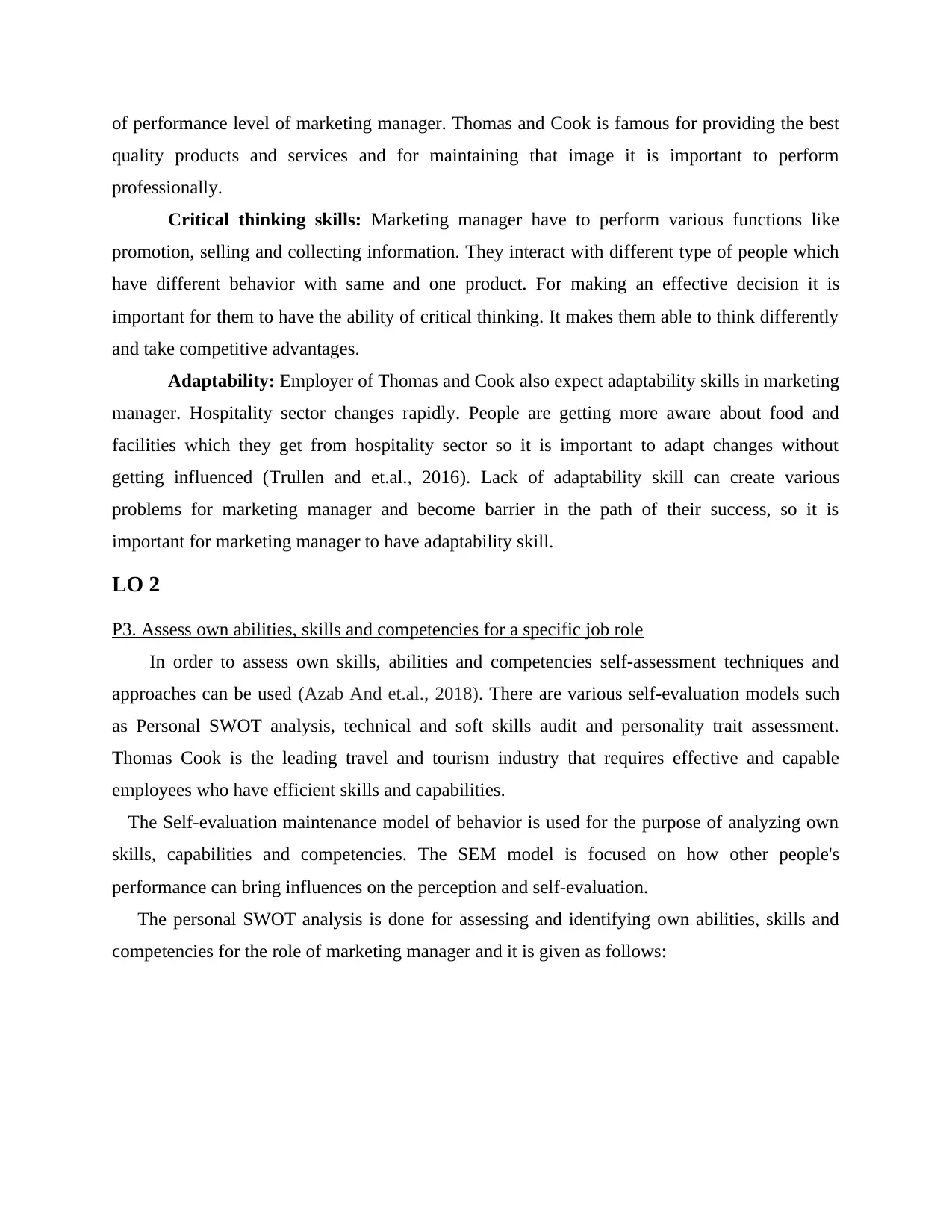
of performance level of marketing manager. Thomas and Cook is famous for providing the best
quality products and services and for maintaining that image it is important to perform
professionally.
Critical thinking skills: Marketing manager have to perform various functions like
promotion, selling and collecting information. They interact with different type of people which
have different behavior with same and one product. For making an effective decision it is
important for them to have the ability of critical thinking. It makes them able to think differently
and take competitive advantages.
Adaptability: Employer of Thomas and Cook also expect adaptability skills in marketing
manager. Hospitality sector changes rapidly. People are getting more aware about food and
facilities which they get from hospitality sector so it is important to adapt changes without
getting influenced (Trullen and et.al., 2016). Lack of adaptability skill can create various
problems for marketing manager and become barrier in the path of their success, so it is
important for marketing manager to have adaptability skill.
LO 2
P3. Assess own abilities, skills and competencies for a specific job role
In order to assess own skills, abilities and competencies self-assessment techniques and
approaches can be used (Azab And et.al., 2018). There are various self-evaluation models such
as Personal SWOT analysis, technical and soft skills audit and personality trait assessment.
Thomas Cook is the leading travel and tourism industry that requires effective and capable
employees who have efficient skills and capabilities.
The Self-evaluation maintenance model of behavior is used for the purpose of analyzing own
skills, capabilities and competencies. The SEM model is focused on how other people's
performance can bring influences on the perception and self-evaluation.
The personal SWOT analysis is done for assessing and identifying own abilities, skills and
competencies for the role of marketing manager and it is given as follows:
quality products and services and for maintaining that image it is important to perform
professionally.
Critical thinking skills: Marketing manager have to perform various functions like
promotion, selling and collecting information. They interact with different type of people which
have different behavior with same and one product. For making an effective decision it is
important for them to have the ability of critical thinking. It makes them able to think differently
and take competitive advantages.
Adaptability: Employer of Thomas and Cook also expect adaptability skills in marketing
manager. Hospitality sector changes rapidly. People are getting more aware about food and
facilities which they get from hospitality sector so it is important to adapt changes without
getting influenced (Trullen and et.al., 2016). Lack of adaptability skill can create various
problems for marketing manager and become barrier in the path of their success, so it is
important for marketing manager to have adaptability skill.
LO 2
P3. Assess own abilities, skills and competencies for a specific job role
In order to assess own skills, abilities and competencies self-assessment techniques and
approaches can be used (Azab And et.al., 2018). There are various self-evaluation models such
as Personal SWOT analysis, technical and soft skills audit and personality trait assessment.
Thomas Cook is the leading travel and tourism industry that requires effective and capable
employees who have efficient skills and capabilities.
The Self-evaluation maintenance model of behavior is used for the purpose of analyzing own
skills, capabilities and competencies. The SEM model is focused on how other people's
performance can bring influences on the perception and self-evaluation.
The personal SWOT analysis is done for assessing and identifying own abilities, skills and
competencies for the role of marketing manager and it is given as follows:
⊘ This is a preview!⊘
Do you want full access?
Subscribe today to unlock all pages.

Trusted by 1+ million students worldwide
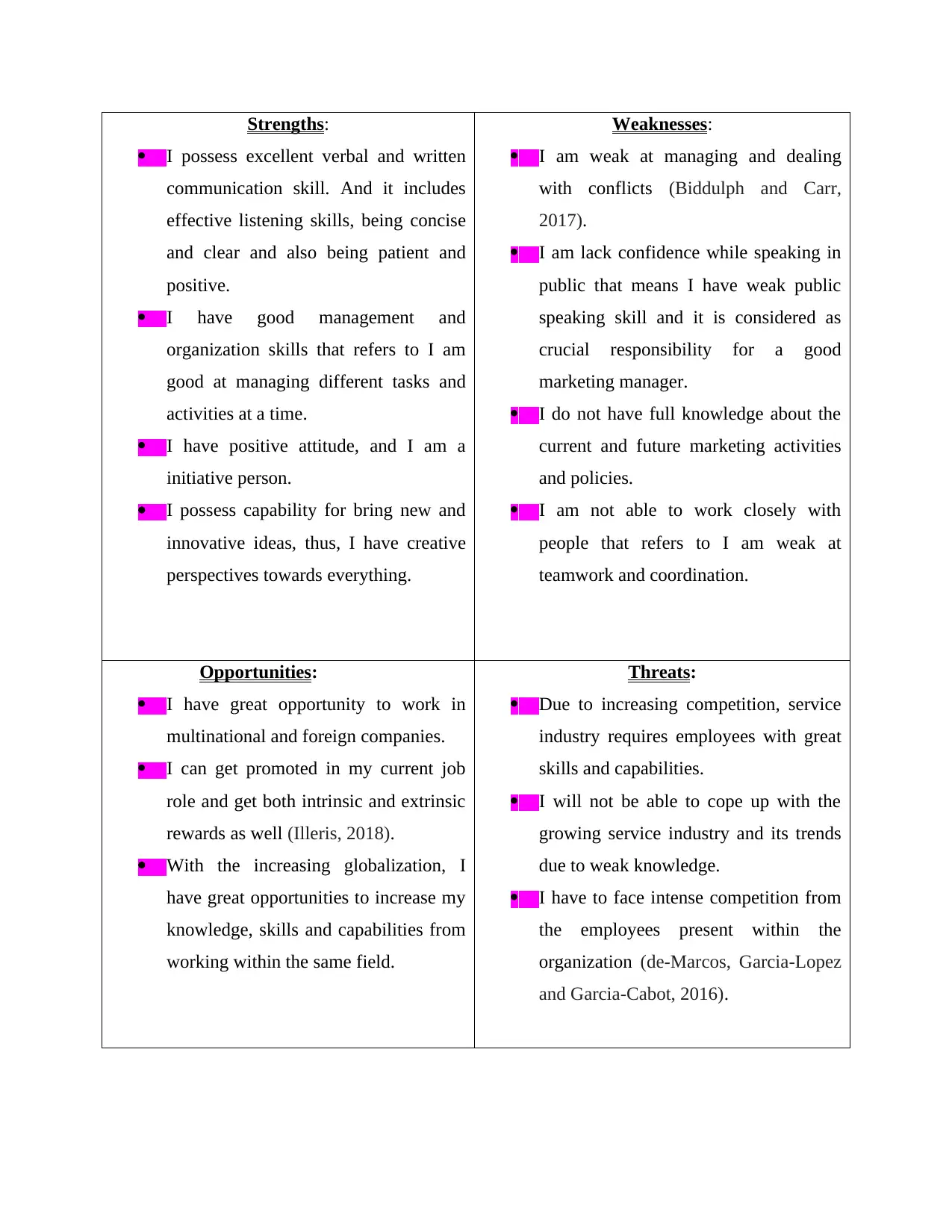
Strengths:
I possess excellent verbal and written
communication skill. And it includes
effective listening skills, being concise
and clear and also being patient and
positive.
I have good management and
organization skills that refers to I am
good at managing different tasks and
activities at a time.
I have positive attitude, and I am a
initiative person.
I possess capability for bring new and
innovative ideas, thus, I have creative
perspectives towards everything.
Weaknesses:
I am weak at managing and dealing
with conflicts (Biddulph and Carr,
2017).
I am lack confidence while speaking in
public that means I have weak public
speaking skill and it is considered as
crucial responsibility for a good
marketing manager.
I do not have full knowledge about the
current and future marketing activities
and policies.
I am not able to work closely with
people that refers to I am weak at
teamwork and coordination.
Opportunities:
I have great opportunity to work in
multinational and foreign companies.
I can get promoted in my current job
role and get both intrinsic and extrinsic
rewards as well (Illeris, 2018).
With the increasing globalization, I
have great opportunities to increase my
knowledge, skills and capabilities from
working within the same field.
Threats:
Due to increasing competition, service
industry requires employees with great
skills and capabilities.
I will not be able to cope up with the
growing service industry and its trends
due to weak knowledge.
I have to face intense competition from
the employees present within the
organization (de-Marcos, Garcia-Lopez
and Garcia-Cabot, 2016).
I possess excellent verbal and written
communication skill. And it includes
effective listening skills, being concise
and clear and also being patient and
positive.
I have good management and
organization skills that refers to I am
good at managing different tasks and
activities at a time.
I have positive attitude, and I am a
initiative person.
I possess capability for bring new and
innovative ideas, thus, I have creative
perspectives towards everything.
Weaknesses:
I am weak at managing and dealing
with conflicts (Biddulph and Carr,
2017).
I am lack confidence while speaking in
public that means I have weak public
speaking skill and it is considered as
crucial responsibility for a good
marketing manager.
I do not have full knowledge about the
current and future marketing activities
and policies.
I am not able to work closely with
people that refers to I am weak at
teamwork and coordination.
Opportunities:
I have great opportunity to work in
multinational and foreign companies.
I can get promoted in my current job
role and get both intrinsic and extrinsic
rewards as well (Illeris, 2018).
With the increasing globalization, I
have great opportunities to increase my
knowledge, skills and capabilities from
working within the same field.
Threats:
Due to increasing competition, service
industry requires employees with great
skills and capabilities.
I will not be able to cope up with the
growing service industry and its trends
due to weak knowledge.
I have to face intense competition from
the employees present within the
organization (de-Marcos, Garcia-Lopez
and Garcia-Cabot, 2016).
Paraphrase This Document
Need a fresh take? Get an instant paraphrase of this document with our AI Paraphraser
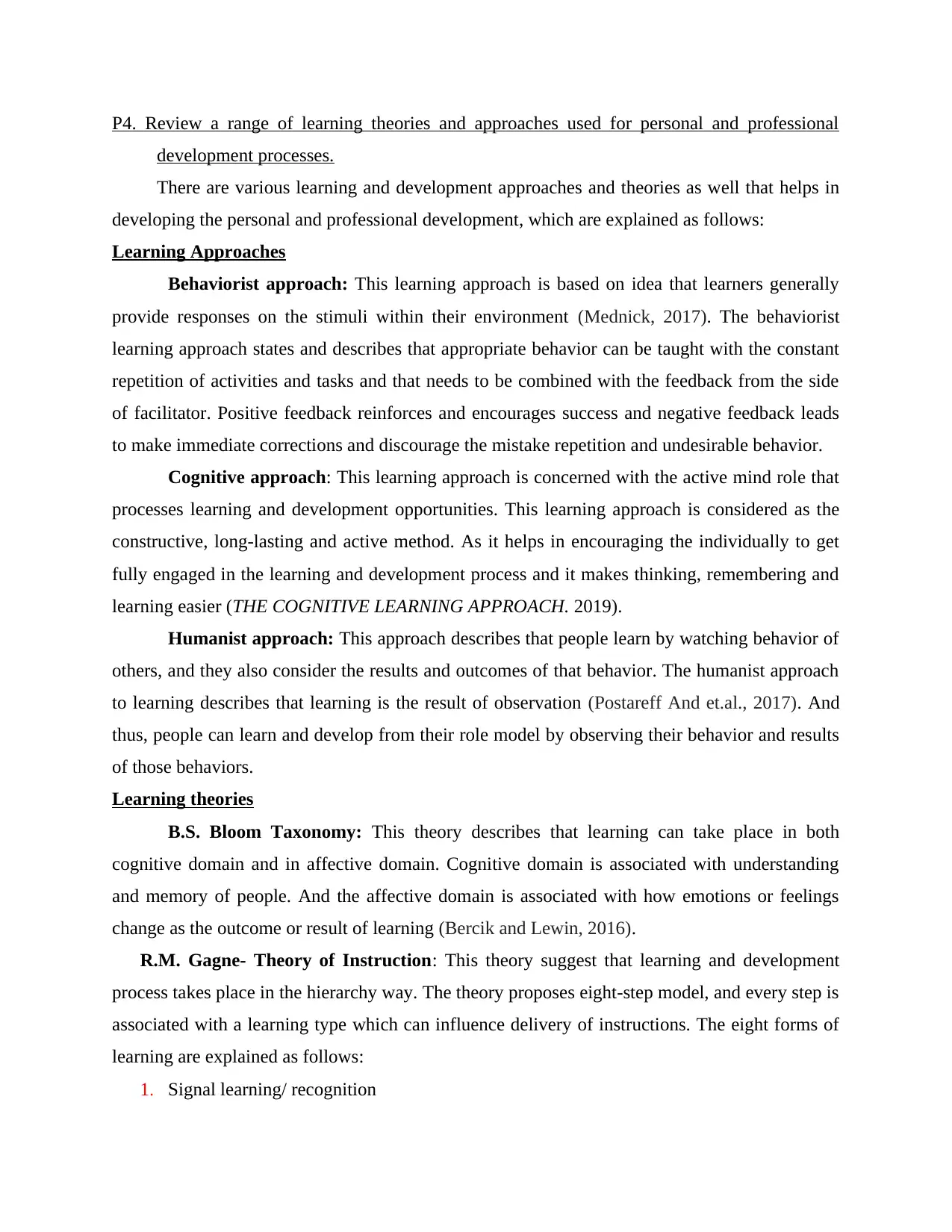
P4. Review a range of learning theories and approaches used for personal and professional
development processes.
There are various learning and development approaches and theories as well that helps in
developing the personal and professional development, which are explained as follows:
Learning Approaches
Behaviorist approach: This learning approach is based on idea that learners generally
provide responses on the stimuli within their environment (Mednick, 2017). The behaviorist
learning approach states and describes that appropriate behavior can be taught with the constant
repetition of activities and tasks and that needs to be combined with the feedback from the side
of facilitator. Positive feedback reinforces and encourages success and negative feedback leads
to make immediate corrections and discourage the mistake repetition and undesirable behavior.
Cognitive approach: This learning approach is concerned with the active mind role that
processes learning and development opportunities. This learning approach is considered as the
constructive, long-lasting and active method. As it helps in encouraging the individually to get
fully engaged in the learning and development process and it makes thinking, remembering and
learning easier (THE COGNITIVE LEARNING APPROACH. 2019).
Humanist approach: This approach describes that people learn by watching behavior of
others, and they also consider the results and outcomes of that behavior. The humanist approach
to learning describes that learning is the result of observation (Postareff And et.al., 2017). And
thus, people can learn and develop from their role model by observing their behavior and results
of those behaviors.
Learning theories
B.S. Bloom Taxonomy: This theory describes that learning can take place in both
cognitive domain and in affective domain. Cognitive domain is associated with understanding
and memory of people. And the affective domain is associated with how emotions or feelings
change as the outcome or result of learning (Bercik and Lewin, 2016).
R.M. Gagne- Theory of Instruction: This theory suggest that learning and development
process takes place in the hierarchy way. The theory proposes eight-step model, and every step is
associated with a learning type which can influence delivery of instructions. The eight forms of
learning are explained as follows:
1. Signal learning/ recognition
development processes.
There are various learning and development approaches and theories as well that helps in
developing the personal and professional development, which are explained as follows:
Learning Approaches
Behaviorist approach: This learning approach is based on idea that learners generally
provide responses on the stimuli within their environment (Mednick, 2017). The behaviorist
learning approach states and describes that appropriate behavior can be taught with the constant
repetition of activities and tasks and that needs to be combined with the feedback from the side
of facilitator. Positive feedback reinforces and encourages success and negative feedback leads
to make immediate corrections and discourage the mistake repetition and undesirable behavior.
Cognitive approach: This learning approach is concerned with the active mind role that
processes learning and development opportunities. This learning approach is considered as the
constructive, long-lasting and active method. As it helps in encouraging the individually to get
fully engaged in the learning and development process and it makes thinking, remembering and
learning easier (THE COGNITIVE LEARNING APPROACH. 2019).
Humanist approach: This approach describes that people learn by watching behavior of
others, and they also consider the results and outcomes of that behavior. The humanist approach
to learning describes that learning is the result of observation (Postareff And et.al., 2017). And
thus, people can learn and develop from their role model by observing their behavior and results
of those behaviors.
Learning theories
B.S. Bloom Taxonomy: This theory describes that learning can take place in both
cognitive domain and in affective domain. Cognitive domain is associated with understanding
and memory of people. And the affective domain is associated with how emotions or feelings
change as the outcome or result of learning (Bercik and Lewin, 2016).
R.M. Gagne- Theory of Instruction: This theory suggest that learning and development
process takes place in the hierarchy way. The theory proposes eight-step model, and every step is
associated with a learning type which can influence delivery of instructions. The eight forms of
learning are explained as follows:
1. Signal learning/ recognition
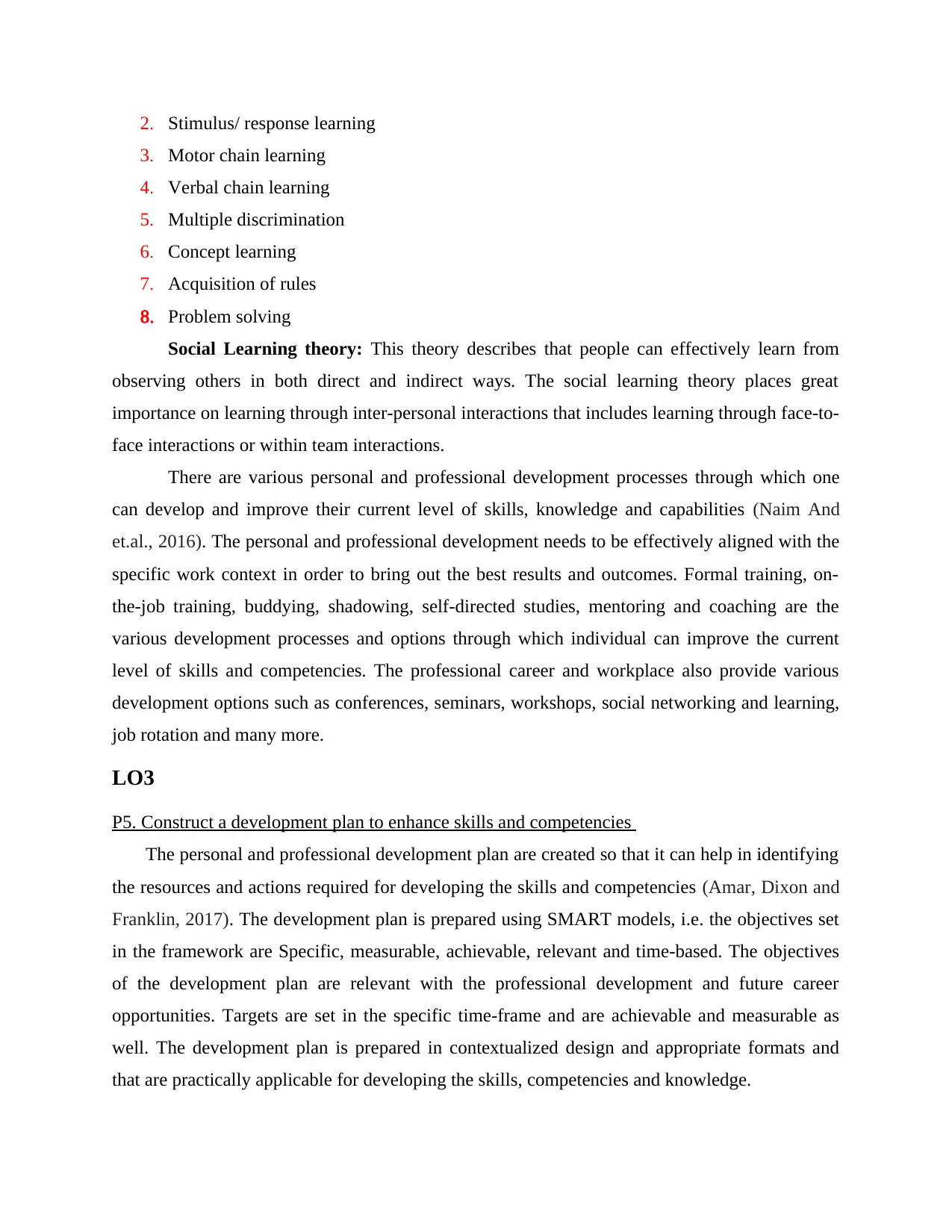
2. Stimulus/ response learning
3. Motor chain learning
4. Verbal chain learning
5. Multiple discrimination
6. Concept learning
7. Acquisition of rules
8. Problem solving
Social Learning theory: This theory describes that people can effectively learn from
observing others in both direct and indirect ways. The social learning theory places great
importance on learning through inter-personal interactions that includes learning through face-to-
face interactions or within team interactions.
There are various personal and professional development processes through which one
can develop and improve their current level of skills, knowledge and capabilities (Naim And
et.al., 2016). The personal and professional development needs to be effectively aligned with the
specific work context in order to bring out the best results and outcomes. Formal training, on-
the-job training, buddying, shadowing, self-directed studies, mentoring and coaching are the
various development processes and options through which individual can improve the current
level of skills and competencies. The professional career and workplace also provide various
development options such as conferences, seminars, workshops, social networking and learning,
job rotation and many more.
LO3
P5. Construct a development plan to enhance skills and competencies
The personal and professional development plan are created so that it can help in identifying
the resources and actions required for developing the skills and competencies (Amar, Dixon and
Franklin, 2017). The development plan is prepared using SMART models, i.e. the objectives set
in the framework are Specific, measurable, achievable, relevant and time-based. The objectives
of the development plan are relevant with the professional development and future career
opportunities. Targets are set in the specific time-frame and are achievable and measurable as
well. The development plan is prepared in contextualized design and appropriate formats and
that are practically applicable for developing the skills, competencies and knowledge.
3. Motor chain learning
4. Verbal chain learning
5. Multiple discrimination
6. Concept learning
7. Acquisition of rules
8. Problem solving
Social Learning theory: This theory describes that people can effectively learn from
observing others in both direct and indirect ways. The social learning theory places great
importance on learning through inter-personal interactions that includes learning through face-to-
face interactions or within team interactions.
There are various personal and professional development processes through which one
can develop and improve their current level of skills, knowledge and capabilities (Naim And
et.al., 2016). The personal and professional development needs to be effectively aligned with the
specific work context in order to bring out the best results and outcomes. Formal training, on-
the-job training, buddying, shadowing, self-directed studies, mentoring and coaching are the
various development processes and options through which individual can improve the current
level of skills and competencies. The professional career and workplace also provide various
development options such as conferences, seminars, workshops, social networking and learning,
job rotation and many more.
LO3
P5. Construct a development plan to enhance skills and competencies
The personal and professional development plan are created so that it can help in identifying
the resources and actions required for developing the skills and competencies (Amar, Dixon and
Franklin, 2017). The development plan is prepared using SMART models, i.e. the objectives set
in the framework are Specific, measurable, achievable, relevant and time-based. The objectives
of the development plan are relevant with the professional development and future career
opportunities. Targets are set in the specific time-frame and are achievable and measurable as
well. The development plan is prepared in contextualized design and appropriate formats and
that are practically applicable for developing the skills, competencies and knowledge.
⊘ This is a preview!⊘
Do you want full access?
Subscribe today to unlock all pages.

Trusted by 1+ million students worldwide
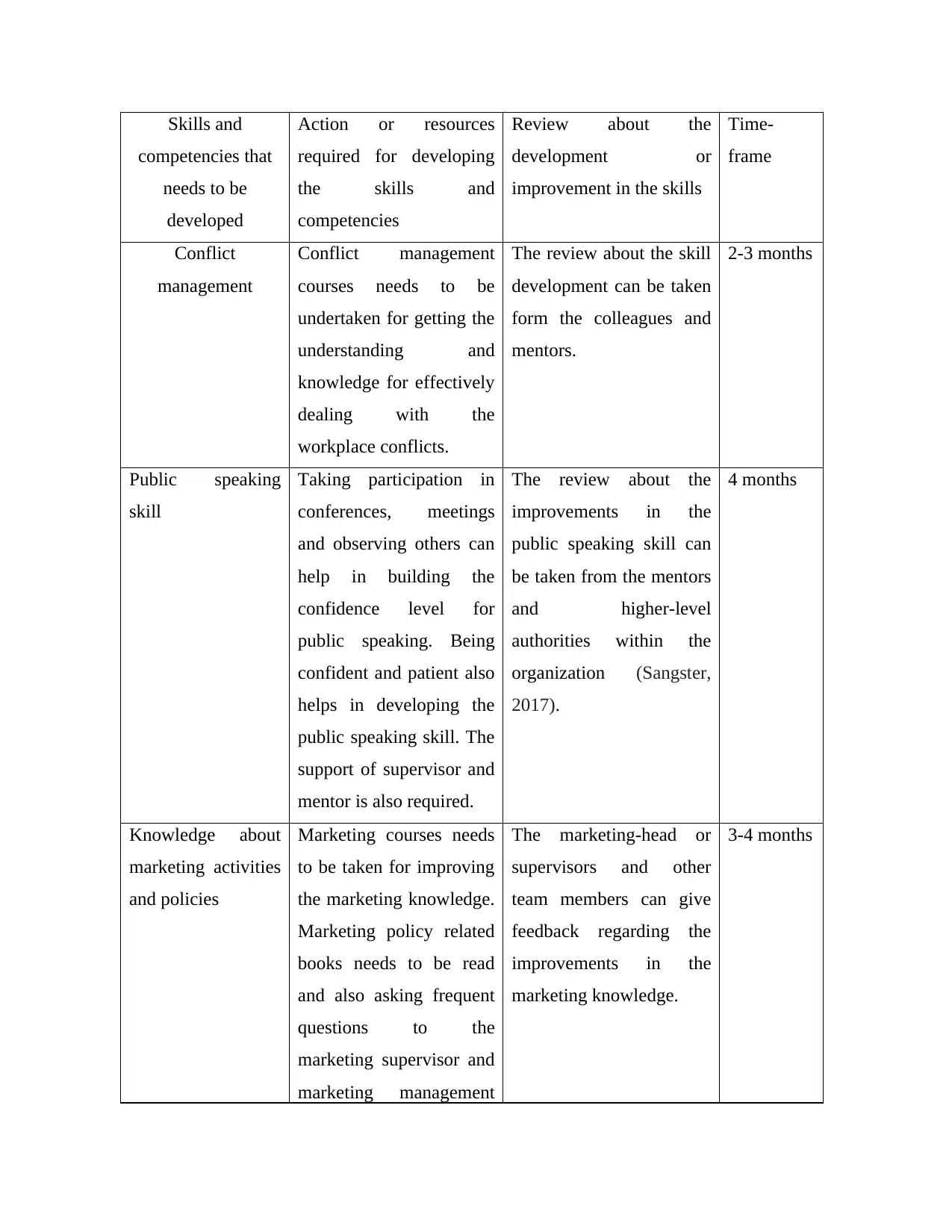
Skills and
competencies that
needs to be
developed
Action or resources
required for developing
the skills and
competencies
Review about the
development or
improvement in the skills
Time-
frame
Conflict
management
Conflict management
courses needs to be
undertaken for getting the
understanding and
knowledge for effectively
dealing with the
workplace conflicts.
The review about the skill
development can be taken
form the colleagues and
mentors.
2-3 months
Public speaking
skill
Taking participation in
conferences, meetings
and observing others can
help in building the
confidence level for
public speaking. Being
confident and patient also
helps in developing the
public speaking skill. The
support of supervisor and
mentor is also required.
The review about the
improvements in the
public speaking skill can
be taken from the mentors
and higher-level
authorities within the
organization (Sangster,
2017).
4 months
Knowledge about
marketing activities
and policies
Marketing courses needs
to be taken for improving
the marketing knowledge.
Marketing policy related
books needs to be read
and also asking frequent
questions to the
marketing supervisor and
marketing management
The marketing-head or
supervisors and other
team members can give
feedback regarding the
improvements in the
marketing knowledge.
3-4 months
competencies that
needs to be
developed
Action or resources
required for developing
the skills and
competencies
Review about the
development or
improvement in the skills
Time-
frame
Conflict
management
Conflict management
courses needs to be
undertaken for getting the
understanding and
knowledge for effectively
dealing with the
workplace conflicts.
The review about the skill
development can be taken
form the colleagues and
mentors.
2-3 months
Public speaking
skill
Taking participation in
conferences, meetings
and observing others can
help in building the
confidence level for
public speaking. Being
confident and patient also
helps in developing the
public speaking skill. The
support of supervisor and
mentor is also required.
The review about the
improvements in the
public speaking skill can
be taken from the mentors
and higher-level
authorities within the
organization (Sangster,
2017).
4 months
Knowledge about
marketing activities
and policies
Marketing courses needs
to be taken for improving
the marketing knowledge.
Marketing policy related
books needs to be read
and also asking frequent
questions to the
marketing supervisor and
marketing management
The marketing-head or
supervisors and other
team members can give
feedback regarding the
improvements in the
marketing knowledge.
3-4 months
Paraphrase This Document
Need a fresh take? Get an instant paraphrase of this document with our AI Paraphraser
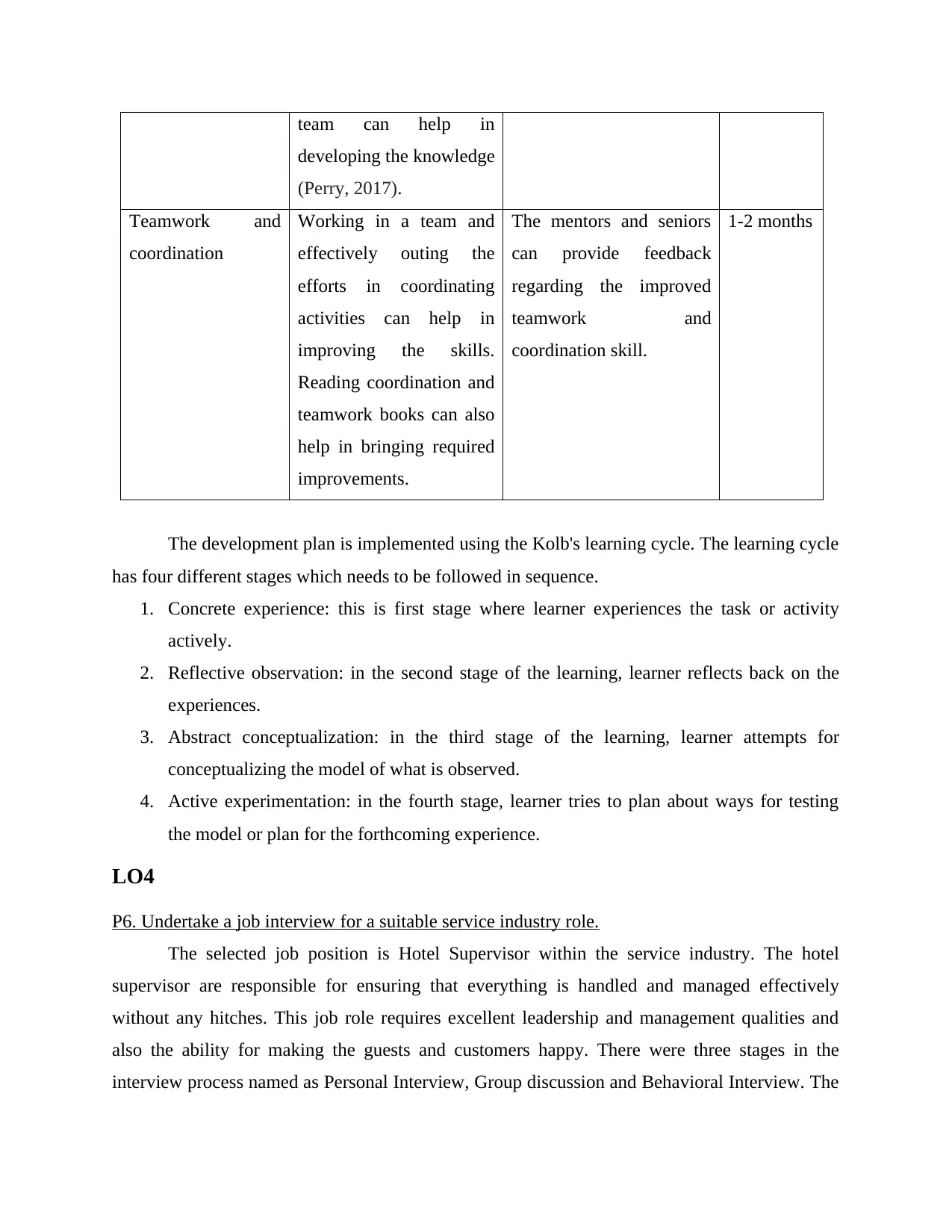
team can help in
developing the knowledge
(Perry, 2017).
Teamwork and
coordination
Working in a team and
effectively outing the
efforts in coordinating
activities can help in
improving the skills.
Reading coordination and
teamwork books can also
help in bringing required
improvements.
The mentors and seniors
can provide feedback
regarding the improved
teamwork and
coordination skill.
1-2 months
The development plan is implemented using the Kolb's learning cycle. The learning cycle
has four different stages which needs to be followed in sequence.
1. Concrete experience: this is first stage where learner experiences the task or activity
actively.
2. Reflective observation: in the second stage of the learning, learner reflects back on the
experiences.
3. Abstract conceptualization: in the third stage of the learning, learner attempts for
conceptualizing the model of what is observed.
4. Active experimentation: in the fourth stage, learner tries to plan about ways for testing
the model or plan for the forthcoming experience.
LO4
P6. Undertake a job interview for a suitable service industry role.
The selected job position is Hotel Supervisor within the service industry. The hotel
supervisor are responsible for ensuring that everything is handled and managed effectively
without any hitches. This job role requires excellent leadership and management qualities and
also the ability for making the guests and customers happy. There were three stages in the
interview process named as Personal Interview, Group discussion and Behavioral Interview. The
developing the knowledge
(Perry, 2017).
Teamwork and
coordination
Working in a team and
effectively outing the
efforts in coordinating
activities can help in
improving the skills.
Reading coordination and
teamwork books can also
help in bringing required
improvements.
The mentors and seniors
can provide feedback
regarding the improved
teamwork and
coordination skill.
1-2 months
The development plan is implemented using the Kolb's learning cycle. The learning cycle
has four different stages which needs to be followed in sequence.
1. Concrete experience: this is first stage where learner experiences the task or activity
actively.
2. Reflective observation: in the second stage of the learning, learner reflects back on the
experiences.
3. Abstract conceptualization: in the third stage of the learning, learner attempts for
conceptualizing the model of what is observed.
4. Active experimentation: in the fourth stage, learner tries to plan about ways for testing
the model or plan for the forthcoming experience.
LO4
P6. Undertake a job interview for a suitable service industry role.
The selected job position is Hotel Supervisor within the service industry. The hotel
supervisor are responsible for ensuring that everything is handled and managed effectively
without any hitches. This job role requires excellent leadership and management qualities and
also the ability for making the guests and customers happy. There were three stages in the
interview process named as Personal Interview, Group discussion and Behavioral Interview. The
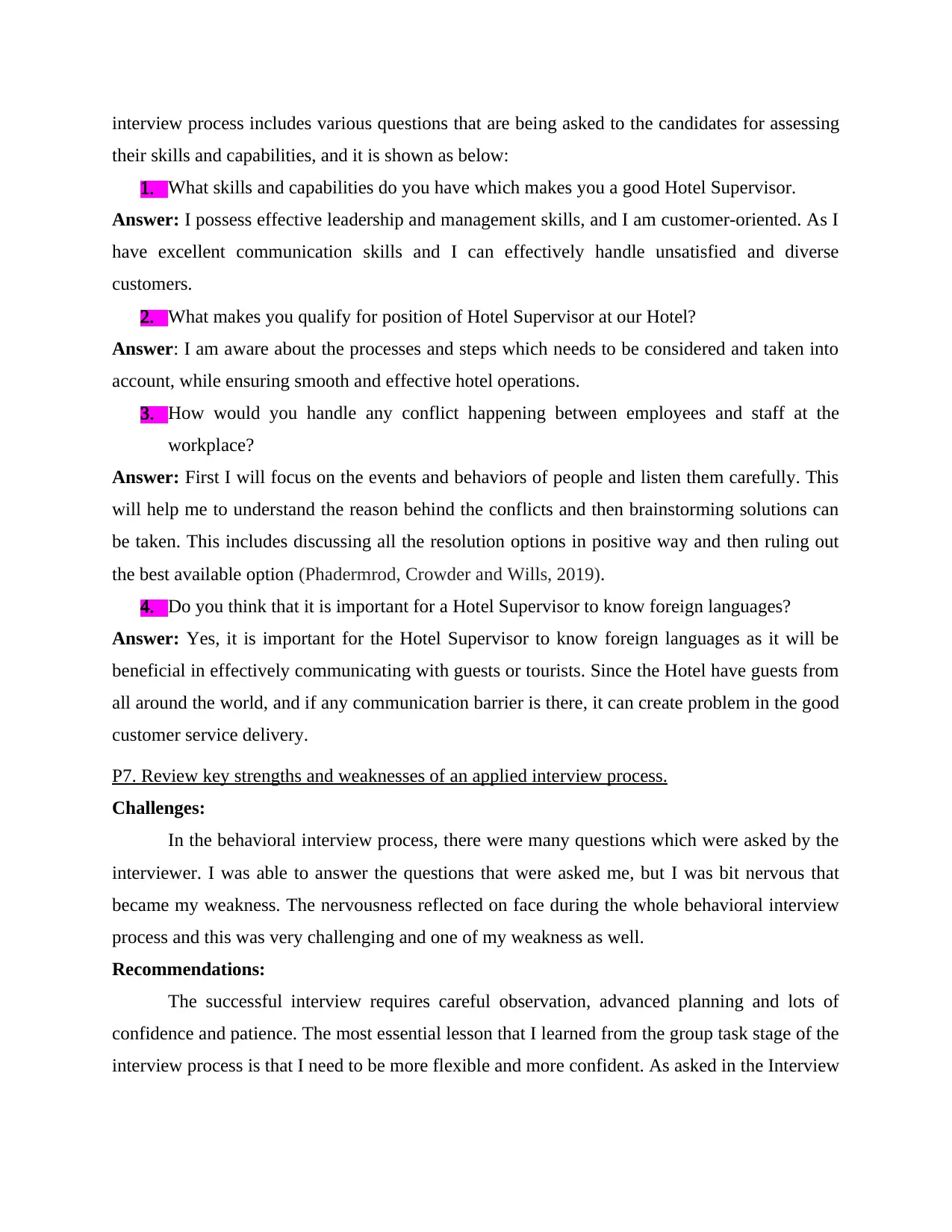
interview process includes various questions that are being asked to the candidates for assessing
their skills and capabilities, and it is shown as below:
1. What skills and capabilities do you have which makes you a good Hotel Supervisor.
Answer: I possess effective leadership and management skills, and I am customer-oriented. As I
have excellent communication skills and I can effectively handle unsatisfied and diverse
customers.
2. What makes you qualify for position of Hotel Supervisor at our Hotel?
Answer: I am aware about the processes and steps which needs to be considered and taken into
account, while ensuring smooth and effective hotel operations.
3. How would you handle any conflict happening between employees and staff at the
workplace?
Answer: First I will focus on the events and behaviors of people and listen them carefully. This
will help me to understand the reason behind the conflicts and then brainstorming solutions can
be taken. This includes discussing all the resolution options in positive way and then ruling out
the best available option (Phadermrod, Crowder and Wills, 2019).
4. Do you think that it is important for a Hotel Supervisor to know foreign languages?
Answer: Yes, it is important for the Hotel Supervisor to know foreign languages as it will be
beneficial in effectively communicating with guests or tourists. Since the Hotel have guests from
all around the world, and if any communication barrier is there, it can create problem in the good
customer service delivery.
P7. Review key strengths and weaknesses of an applied interview process.
Challenges:
In the behavioral interview process, there were many questions which were asked by the
interviewer. I was able to answer the questions that were asked me, but I was bit nervous that
became my weakness. The nervousness reflected on face during the whole behavioral interview
process and this was very challenging and one of my weakness as well.
Recommendations:
The successful interview requires careful observation, advanced planning and lots of
confidence and patience. The most essential lesson that I learned from the group task stage of the
interview process is that I need to be more flexible and more confident. As asked in the Interview
their skills and capabilities, and it is shown as below:
1. What skills and capabilities do you have which makes you a good Hotel Supervisor.
Answer: I possess effective leadership and management skills, and I am customer-oriented. As I
have excellent communication skills and I can effectively handle unsatisfied and diverse
customers.
2. What makes you qualify for position of Hotel Supervisor at our Hotel?
Answer: I am aware about the processes and steps which needs to be considered and taken into
account, while ensuring smooth and effective hotel operations.
3. How would you handle any conflict happening between employees and staff at the
workplace?
Answer: First I will focus on the events and behaviors of people and listen them carefully. This
will help me to understand the reason behind the conflicts and then brainstorming solutions can
be taken. This includes discussing all the resolution options in positive way and then ruling out
the best available option (Phadermrod, Crowder and Wills, 2019).
4. Do you think that it is important for a Hotel Supervisor to know foreign languages?
Answer: Yes, it is important for the Hotel Supervisor to know foreign languages as it will be
beneficial in effectively communicating with guests or tourists. Since the Hotel have guests from
all around the world, and if any communication barrier is there, it can create problem in the good
customer service delivery.
P7. Review key strengths and weaknesses of an applied interview process.
Challenges:
In the behavioral interview process, there were many questions which were asked by the
interviewer. I was able to answer the questions that were asked me, but I was bit nervous that
became my weakness. The nervousness reflected on face during the whole behavioral interview
process and this was very challenging and one of my weakness as well.
Recommendations:
The successful interview requires careful observation, advanced planning and lots of
confidence and patience. The most essential lesson that I learned from the group task stage of the
interview process is that I need to be more flexible and more confident. As asked in the Interview
⊘ This is a preview!⊘
Do you want full access?
Subscribe today to unlock all pages.

Trusted by 1+ million students worldwide
1 out of 15
Related Documents
Your All-in-One AI-Powered Toolkit for Academic Success.
+13062052269
info@desklib.com
Available 24*7 on WhatsApp / Email
![[object Object]](/_next/static/media/star-bottom.7253800d.svg)
Unlock your academic potential
Copyright © 2020–2025 A2Z Services. All Rights Reserved. Developed and managed by ZUCOL.





